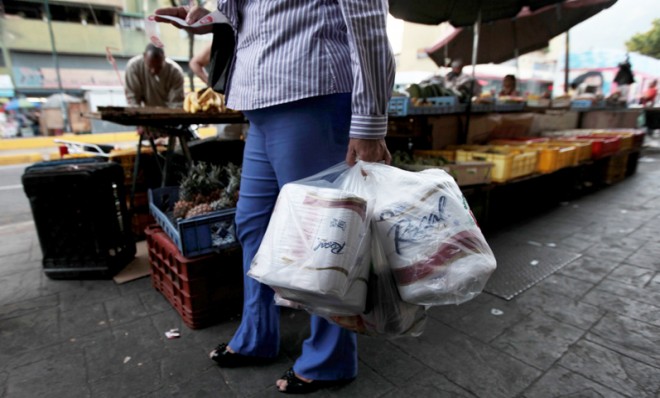Why Venezuela is running out of toilet paper
The government has announced an emergency toilet paper run for 50 million rolls

A free daily email with the biggest news stories of the day – and the best features from TheWeek.com
You are now subscribed
Your newsletter sign-up was successful
Venezuelans are scrounging around for toilet paper. Markets throughout the country have run out, and when they are in stock the rolls fly off the shelves.
"This is the last straw," Manuel Fagundes told The Associated Press as he hunted for toilet paper in downtown Caracas. "I'm 71 years old and this is the first time I've seen this."
The problem is so bad that the Venezuelan government says it will import 50 million rolls to help alleviate the shortage.
The Week
Escape your echo chamber. Get the facts behind the news, plus analysis from multiple perspectives.

Sign up for The Week's Free Newsletters
From our morning news briefing to a weekly Good News Newsletter, get the best of The Week delivered directly to your inbox.
From our morning news briefing to a weekly Good News Newsletter, get the best of The Week delivered directly to your inbox.
Why is Venezuela running low on toilet paper?
The government is blaming the media. "There is no deficiency in production, but an excessive demand [is] generating purchases by a nervous population because of a media campaign that has been created to undermine the country," Venezuelan Minister of Commerce Alejandro Fleming said on state-run AVN News. Fleming said that importing 50 million rolls would help the country meet its average monthly usage of 125 million rolls.
Outside economists, like Johns Hopkins professor Steve Hanke, are blaming the government's economic policies:
State-controlled prices — prices that are set below market-clearing price — always result in shortages. The shortage problem will only get worse, as it did over the years in the Soviet Union. [AP]
Venezuela also has tight controls on foreign currency, which makes it hard for companies to import raw materials and equipment, slowing down production of a wide range of goods, according to the AP.
A free daily email with the biggest news stories of the day – and the best features from TheWeek.com
Right now, the scarcity index in Venezuela is at 21 percent — meaning that out of 100 basic goods, 21 of them aren't available on store shelves. Lines for commodities like milk, sugar, cooking oil, corn flour used to make arepas, and, yes, toilet paper, can often stretch down the block.
The flip side of state-controlled prices, writes the BBC's Irene Caselli, is that poor Venezuelans can afford foods that they couldn't before. A kilogram of pasta costs 30 cents at government-run supermarkets. At private markets, it costs 10 times as much.
That has led to a drop in the number of Venezuelans who are undernourished, to less than 5 percent today, from 15 percent in 1999, according to the BBC.
"There are always queues, but we need to be patient," Raul Espana, a 63-year-old retiree, told the BBC. "Before, we couldn't eat a complete diet. Now we can afford everything."
Keith Wagstaff is a staff writer at TheWeek.com covering politics and current events. He has previously written for such publications as TIME, Details, VICE, and the Village Voice.
-
 Switzerland could vote to cap its population
Switzerland could vote to cap its populationUnder the Radar Swiss People’s Party proposes referendum on radical anti-immigration measure to limit residents to 10 million
-
 Political cartoons for February 15
Political cartoons for February 15Cartoons Sunday's political cartoons include political ventriloquism, Europe in the middle, and more
-
 The broken water companies failing England and Wales
The broken water companies failing England and WalesExplainer With rising bills, deteriorating river health and a lack of investment, regulators face an uphill battle to stabilise the industry
-
 The billionaires’ wealth tax: a catastrophe for California?
The billionaires’ wealth tax: a catastrophe for California?Talking Point Peter Thiel and Larry Page preparing to change state residency
-
 Bari Weiss’ ‘60 Minutes’ scandal is about more than one report
Bari Weiss’ ‘60 Minutes’ scandal is about more than one reportIN THE SPOTLIGHT By blocking an approved segment on a controversial prison holding US deportees in El Salvador, the editor-in-chief of CBS News has become the main story
-
 Has Zohran Mamdani shown the Democrats how to win again?
Has Zohran Mamdani shown the Democrats how to win again?Today’s Big Question New York City mayoral election touted as victory for left-wing populists but moderate centrist wins elsewhere present more complex path for Democratic Party
-
 Millions turn out for anti-Trump ‘No Kings’ rallies
Millions turn out for anti-Trump ‘No Kings’ ralliesSpeed Read An estimated 7 million people participated, 2 million more than at the first ‘No Kings’ protest in June
-
 Ghislaine Maxwell: angling for a Trump pardon
Ghislaine Maxwell: angling for a Trump pardonTalking Point Convicted sex trafficker's testimony could shed new light on president's links to Jeffrey Epstein
-
 The last words and final moments of 40 presidents
The last words and final moments of 40 presidentsThe Explainer Some are eloquent quotes worthy of the holders of the highest office in the nation, and others... aren't
-
 The JFK files: the truth at last?
The JFK files: the truth at last?In The Spotlight More than 64,000 previously classified documents relating the 1963 assassination of John F. Kennedy have been released by the Trump administration
-
 'Seriously, not literally': how should the world take Donald Trump?
'Seriously, not literally': how should the world take Donald Trump?Today's big question White House rhetoric and reality look likely to become increasingly blurred